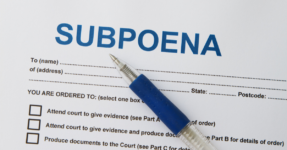Third Parties Cannot Appeal Decisions Relating to Subpoenas in Criminal Cases

A recent judgement of the Supreme Court of New South Wales has made clear the Commissioner of Police has no standing when it comes to opposing the production of materials sought under subpoena to police, as the Commissioner is neither the prosecutor nor the defence; in other words, is not a party to the criminal proceedings.
But before we come to the case itself, it may be useful to provide a quick rundown of the nature, purpose and effect of a subpoena as well as the key term ‘legitimate forensic purpose’.
What is a subpoena?
A subpoena is a court order that compels an individual or an organisation to produce specific materials as part of a legal proceedings (known as a ‘subpoena for production’), or for a person to attend court (a ‘subpoena to give evidence’), or both (a ‘subpoena to give evidence and produce’).
While the document is filed by a party to the proceedings, it is issued by the court and thereby becomes an order of the court – with consequences for failing to comply.
Subpoenas are used by parties in both civil and criminal cases to gather information that is relevant to the proceedings, and to ensure the attendance of important witnesses.
They are a vital tool in the armoury of lawyers as they facilitate the gathering of information which can inform the formulation and execution of strategies to obtain successful outcomes; such as having charges withdrawn or dismissed in criminal proceedings.
What is the meaning of legitimate forensic purpose?
For a subpoena to be valid and enforceable, it must have what’s known as a ‘legitimate forensic purpose’.
A legitimate forensic purpose refers to a genuine and valid reason for requesting specific materials such as documents, evidence and statements from third parties; typically those that are not served with – or intended to be served with – the prosecution’s brief of evidence (the materials relied upon by prosecutors to establish criminal charges).
In making a determination as to whether the subpoena (or part thereof) is valid, the court will assess whether the materials sought are relevant, necessary, and connected to the issues in the legal proceedings.
A legitimate forensic purpose signifies that the requested information is directly relevant to the case, assists in establishing or supporting a party’s case or defence/prosecution, and is not being sought for improper or harassing reasons.
Courts aim to prevent subpoenas from being used as tools for fishing expeditions or harassment, and require that the requested materials have a direct bearing on the legal issues at hand.
Now turning back to the Supreme Court case.
The facts of the case
The criminal defence lawyer for Mr Asaad Alahmad, a man accused of indictable criminal offences, filed a subpoena for production in the New South Wales Local Court which was then served upon the Commissioner of Police (NSW).
The subpoena required police to produce a series of documents which related to the investigation and prosecution of Mr Alahmad in connection to his criminal case.
Two of the paragraphs in the schedule of the subpoena – which is the part of the document that lists the materials sought to be produced from the party who is served were contested; in other words, police did not want to produce them and applied to have them set aside.
It is important to note that no privilege or immunity was sought in relation to the materials sought.
Rather, the reason police gave for the failure to produce and purported opposition to production was that there was no discernible legitimate forensic purpose to call for their production, and seeking to do so was therefore an abuse of court process.
The defence contended that there was indeed a legitimate forensic purpose.
The Local Court decision
After hearing submissions from both sides, Local Court Magistrate Milovanovic found there was indeed a legitimate forensic purpose to seek the materials.
His Honour therefore ordered the Commissioner of Police to produce the materials sought.
Police Commissioner appeals
The Commissioner of Police appealed the learned Magistrate’s decision to the Supreme Court of New South Wales by way of a summons seeking leave (permission) to appeal.
His Honour Justice Garling of the Supreme Court considered the legal principles relevant to the interpretation of the applicable legislation, specifically section 53(3)(a) of the Crimes (Appeal and Review) Act 2001 (NSW)(‘the Act’), which is titled ‘Appeals requiring leave’.
The following legal principles were considered during his Honour’s determination of the appeal:
Jurisdiction and scope to appeal
Firstly, the court considered whether the Commissioner of Police had legal standing to appeal a decision made by a magistrate in the Local Court.
In that regard, section 53(3)(a) of the Act allows for appeals against orders made by magistrates in relation to committal proceedings or interlocutory orders in summary proceedings.
Let’s now take a step back and outline the meanings of ‘committal proceedings’, ‘interlocutory orders’ and ‘summary proceedings’.
Committal proceedings are those during which a determination is made in the Local Court as to whether a reasonable jury properly instructed as to the law could convict the defendant.
If the answer is in the affirmative, the case will be committed (referred) to a higher court such as the District or Supreme Court.
If it is in the negative, the magistrate will dismiss the proceedings and discharge the defendant.
It should be noted that there is a curious rule in the criminal law that, because committal proceedings are considered to be administrative rather than judicial, the prosecution can restore the proceedings despite the dismissal and discharge, through a mechanism known as an ‘ex officio indictment’, and this is one of the reasons criminal defence lawyers need to think carefully before contesting proceedings at the committal stage and potentially revealing their defence strategy.
Interlocutory orders are those made before a case reaches a defended hearing (in the Local Court) or a trial (in the District or Supreme Court).
And summary proceedings are that take place in the Local Court, rather than a higher court such as the District or Supreme Court.
Now back to the case before the court.
The central issue in the Supreme Court appeal was whether section 53(3)(a) extends to third parties; in other words, to entities other than the defendant and prosecutor.
Interpretation of “any person”
The court examined the phrase “Any person” contained in 53(3)(a) of the Act.
The question was whether this phrase encompasses third parties such as the Commissioner of Police who, again, is was not a party to the prosecution brought against Mr Alahmad.
The barrister for the the Commissioner submitted to the court that the term should be interpreted broadly.
The lawyer for defendant contended that it should only apply to parties to criminal proceedings; that is, to defendants and prosecutors.
Contextual analysis
The court analysed the context of the Act, including the structure and headings of different divisions within Part 5. Divisions 1 and 2 of Part 5 of the Act address appeals by defendants and appeals by prosecutors, respectively.
The court considered whether the text and headings suggested that section 53(3)(a) was intended to apply exclusively to defendants and prosecutors.
Precedents
The court referenced the decision of Commissioner of Police v Chidgey & Anor [2007] NSWSC 417, where a similar issue was addressed.
In that case, the court concluded that the term “any person” in section 53(3)(a) referred only to defendants and not to third parties.
The court in the present case had to determine whether it should follow this precedent or adopt a different interpretation.
Purpose and history of provision
The court also considered the legislative intent behind the provision, examining its purpose and historical context.
It explored whether the legislative history supported an interpretation that included third parties within the scope of section 53(3)(a).
Judgement
Citing the case of Chidgey, the court determined that term “any person” section 53(3)(a) does not encompass third parties such as the Commissioner of Police (NSW), and only to appeals by defendants and prosecutors.
The court therefore dismissed the summons seeking leave to appeal brought by the Commissioner of Police and ordered the Commissioner to pay the defendant’s legal costs of the proceedings.






